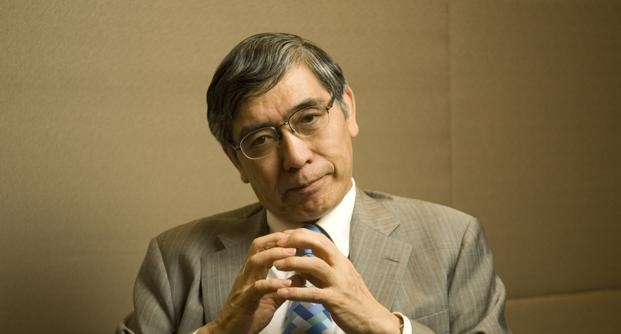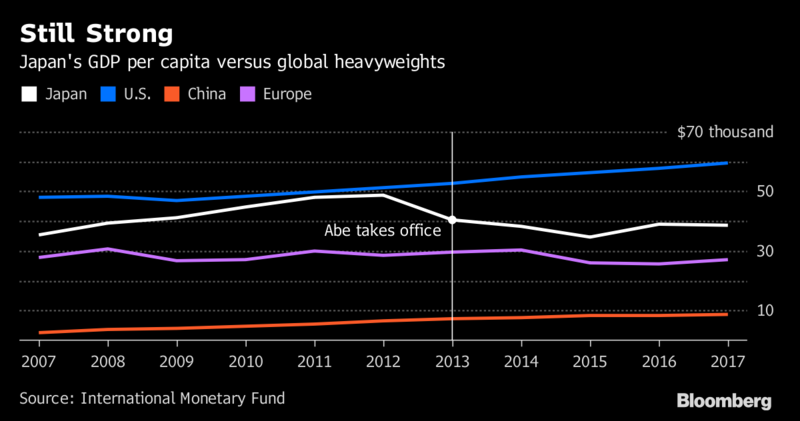Japan’s plans for its economy
February 16, 2018 | Expert Insights

Japanese Prime Minister Shinzo Abe has nominated Haruhiko Kuroda for a second term as the Governor of the Bank of Japan.
What does this mean for the third largest economy in the world?
Background
Japan is the third largest economy in the world by nominal GDP after America and China. It has the fourth largest purchasing power parity. It is also considered the world’s second largest developed economy. After the devastation by World War II, it achieved a steady and significant growth in the second half of 20th century. Much of its expansion was due to its highly successful automotive and consumer electronic industries.
In 2017, it was revealed that Japan has blown past industry and market expectations with its growth. According to the official numbers, its GDP expanded at an annualized rate of 4% in the April-to-June period. Industry had forecast a rise of just 2.5%.
This is the sixth straight quarter of growth for the country. The robust growth in the economy has been attributed to a rise in exports especially smart phones. The economy has also been boosted due to the investments made to the Tokyo 2020 Olympics.
Rob Carnell, chief Asia-Pacific economist at ING told the Financial Times that this growth was not due to any flukes. He notes, “This was not one of those flukey one-offs that was caused by a surge in inventories that will be worked down in coming quarters, or one of those random spikes caused by exports and imports growing out of sync.” Recently, Abe re-shuffled his cabinet and noted that economy would be his primary focus.
Abenomics
Japanese Prime Minister Shinzo Abe came into power in 2012 on the promise of rejuvenating the economy. Japan, while a developed nation, had been going through a period of near zero growth. Abe introduced a series of economic reforms that were called Abenomics. It is based on "three arrows" of monetary easing, fiscal stimulus and structural reforms.
Bank of Japan
Founded in 1882, the Bank of Japan is the central bank of Japan. Haruhiko Kuroda is the 31st and current Governor of BOJ. He was formerly the President of the Asian Development Bank from 1 February 2005 to 18 March 2013.

Analysis
Japan’s economy expanded by 0.5% at an annualized rate between October and December in 2017. This is lesser than estimate for annualized growth of 0.9%. Overall, domestic demand grew 0.1%. However, this is lesser than the 0.5% rise that the region experienced in the previous quarter. Capital expenditure rose by 0.7%.
In February 2018, Prime Minister Shinzo Abe once again nominated Haruhiko Kuroda to lead the Bank of Japan. Each term for Governor of the Central Bank is five years. In addition, the government also nominated Masazumi Wakatabe, a professor at Waseda University and BOJ Executive Director Masayoshi Amamiya for the position of Deputy Governors. Wakatabe is known for being a fierce advocate for aggressive monetary easing.
In 2018, Kuroda said that the nation’s stubbornly low inflation rates had finally begun to rise. "There are some indications that wages are actually rising and some prices have started to rise," Kuroda said. "There are many factors that made the 2 percent target difficult and time-consuming but we are finally close."
Wakatabe’s appointment indicates that the nation will continue with the current policy of aggressive stimulus to encourage growth. “The choices point to continuity in policy, with an implicit message that Japan will do what it takes to reflate the economy, even as other major central banks start to withdraw stimulus," Bloomberg writer Yuki Masujima wrote.
Assessment
Our assessment is that BOJ's ultra-easy policy is likely to stay in place in a bid to continue encouraging the economy. The Governor’s main agenda would be to get inflation rates to reach the 2% target. There are some obstacles that might cause problems for the country’s economy. Despite incremental rise in inflation, wages have remained low. The nation’s ageing and shrinking population will be a cause of concern as well. In addition, many of Japan’s flagship companies are currently caught in major cheating scandals that might further dent the nation’s prospects for growth.








Comments